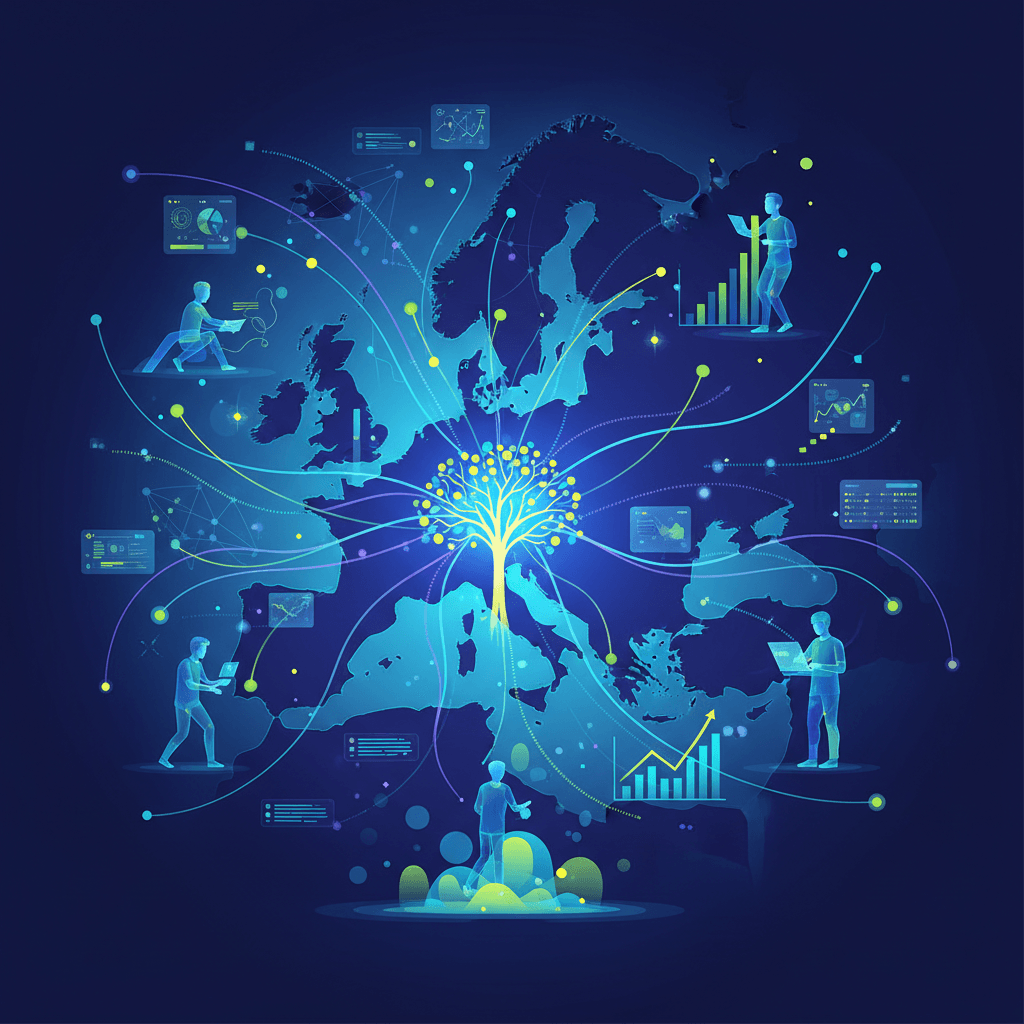Europe Cracks AI Talent Shortage with Innovative Education Blueprint
Beyond the scramble: Europe's AI education blueprint offers businesses critical lessons for building an adaptable, AI-fluent workforce.
November 19, 2025

The global scramble for artificial intelligence talent has become a defining challenge for modern business, as crucial to success as product innovation. Demand for AI skills is dramatically outpacing supply, creating a fierce competition for a limited pool of experts.[1] While many businesses feel the pressure of this skills gap, a series of ambitious educational experiments across Europe are providing a valuable blueprint for cultivating the next generation of AI-ready professionals. These initiatives, spanning from continental strategies to national programs and novel teaching methods, offer critical lessons for any business looking to build a sustainable talent pipeline and foster a culture of AI fluency.
At the heart of Europe's approach is a coordinated, top-down strategy designed to address the AI skills shortage at a systemic level. The European Union has launched comprehensive plans like the "AI Continent Action Plan" and the "AI Skills Strategy for Europe," which aim to reduce skills gaps and mismatches across member states.[2][3] This is backed by significant investment, including a massive public-private partnership in AI, Data, and Robotics valued at €2.6 billion to drive innovation.[4][5] The forthcoming AI Skills Academy is set to further bolster these efforts by offering specialized training in generative AI and developing new AI-focused degree programs.[6][3] This collective effort underscores a key lesson for the private sector: tackling the talent shortage requires an ecosystem approach. By fostering collaboration rather than just competition, industries can create a larger, more robust talent pool for everyone. The EU's regulatory landscape also acts as a powerful catalyst, with the landmark EU AI Act mandating that companies ensure their staff have a sufficient level of AI literacy, directly compelling businesses to invest in internal training and education.[6][7]
Beyond the EU-wide framework, individual nations are acting as laboratories for innovation, tailoring AI education to their unique economic strengths. Finland, an early mover, launched its first national AI strategy in 2017 with a core mission to guarantee AI literacy across its entire population.[8][9][10] A cornerstone of this effort is the "Elements of AI," a free online course developed by the University of Helsinki and Reaktor, which has successfully demystified AI for hundreds of thousands of people globally.[8][9] For businesses, Finland’s model demonstrates the profound value of investing in foundational AI knowledge for the entire workforce, not just a handful of specialists. Similarly, France's "AI for Humanity" strategy is now in a second phase focused squarely on expanding the talent pool and doubling the number of AI specialists by 2030, aiming to transform French research centers into international hubs of AI expertise through public-private partnerships.[11][12][13][14] Germany has also committed billions through its national AI strategy and the "DigitalPakt Schule" program, with a notable focus on integrating AI skills into vocational training and supporting small and medium-sized enterprises (SMEs), a lesson in aligning education with industrial reality.[15][16][17]
The most instructive aspect of Europe's experiments lies in the innovative educational models being deployed, which prioritize practice over pure theory. Programs like AI-ENTR4YOUTH, active in ten European countries, embed AI learning within entrepreneurship education for secondary school students.[1][18] Participants use AI tools to build and prototype solutions for real-world challenges, combining technical skills with a business-oriented mindset.[18] This hands-on, problem-solving approach is a direct lesson for corporate training, which must be applied and relevant to generate impact. Another significant trend is the use of AI to create personalized learning pathways.[1][19] Much like how companies such as DHL Express and Deutsche Telekom are using AI to deliver hyper-personalized training and career development for employees, European educators are using AI to tailor content, act as mentors, and adapt to diverse learning styles.[1][19][20][21]
Perhaps the most crucial lesson for business is the shift in mindset from simply using AI to co-creating with it. At institutions like the University of Manchester, future educators are being trained to use generative AI not just as a tool to consume, but as a partner to be used critically, creatively, and ethically.[1] This fosters a more sophisticated level of engagement that businesses must cultivate internally. The future competitive advantage will not be determined by whether a company’s employees use AI, but by how well they collaborate with it to innovate and solve complex problems.[1] These European initiatives show that developing this capability requires more than just technical training; it demands a focus on critical thinking, ethical governance, and a culture of continuous learning.[1]
In conclusion, Europe's multi-layered approach to AI education offers a rich source of inspiration for businesses grappling with the global talent shortage. The continent's strategy demonstrates the importance of building a collaborative ecosystem, the wisdom of investing in broad-based AI literacy for all employees, and the effectiveness of practical, personalized training methods. By moving beyond the frantic pursuit of a few specialists and instead focusing on systematically upskilling their entire workforce, companies can emulate these experiments to build the adaptable, innovative, and AI-fluent organizations required to thrive in the years ahead.
Sources
[4]
[5]
[6]
[8]
[9]
[10]
[11]
[12]
[13]
[14]
[15]
[16]
[17]
[18]
[21]